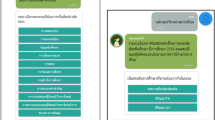Abstract
Chatbots are becoming more popular on websites. To ensure their widespread adoption and effectiveness, it is crucial that the development of these assistant technologies prioritizes user experience, integrating advanced computational methods without losing the human-centric perspective. This paper provides a comprehensive analysis of the insights obtained from the Aragón Intelligent Assistant Project, highlighting the main key lessons from deploying a chatbot dedicated to facilitating accessibility to open data for the regional government of Aragón. This article presents the difficulties and obstacles faced to meet the needs of real users while modern natural language processing technologies are being incorporated. The discussion underscores that, notwithstanding the sophistication of artificial intelligence, the user experience should be prioritized through ongoing evaluation and improvement. Chatbots must be continually tunned to align with human interaction paradigms if they are used to be as valuable tools for citizens.
Supported by ITAINNOVA.
Access this chapter
Tax calculation will be finalised at checkout
Purchases are for personal use only
Similar content being viewed by others
Notes
- 1.
Aragón Open Data: https://opendata.aragon.es/.
- 2.
- 3.
Open Source Data Management https://ckan.org/.
- 4.
COCEMFE http://www.cocemfearagon.org/, Full Inclusion https://www.plenainclusion.org/, CERMI http://www.cermi.es, DFA Foundation https://www.fundaciondfa.es/, ONCE Foundation https://www.fundaciononce.es/, ASZA https://www.asza.net/.
- 5.
María Moliner https://asociacionmujeresmariamoliner.wordpress.com/, Augustinian Culture of Aragon https://www.asociacionagustinadearagon.org/, Amparo Poch https://amparopoch.wordpress.com/, Families and Women in Rural Areas https://www.afammer.es/afammer-aragon/.
- 6.
CAVAragón https://cavaragon.wordpress.com/, Zaragoza Neighbourhood https://barrioszaragoza.org/, Teruel Neighbourhood, Huesca Associations.
References
Bocklisch, T., Faulkner, J., Pawlowski, N., Nichol, A.: Rasa: Open source language understanding and dialogue management. arXiv preprint arXiv:1712.05181 (2017)
Brown, T., et al.: Language models are few-shot learners. Adv. Neural. Inf. Process. Syst. 33, 1877–1901 (2020)
Cantador, I., Viejo-Tardío, J., Cortés-Cediel, M.E., Rodríguez Bolívar, M.P.: A chatbot for searching and exploring open data: Implementation and evaluation in e-government. In: DG. O2021: The 22nd Annual International Conference on Digital Government Research, pp. 168–179 (2021)
Devlin, J., Chang, M.W., Lee, K., Toutanova, K.: Bert: pre-training of deep bidirectional transformers for language understanding (2018). https://doi.org/10.48550/ARXIV.1810.04805, https://arxiv.org/abs/1810.04805
Ed-douibi, H., Cánovas Izquierdo, J.L., Daniel, G., Cabot, J.: A model-based chatbot generation approach to converse with open data sources. In: Brambilla, M., Chbeir, R., Frasincar, F., Manolescu, I. (eds.) Web Engineering: 21st International Conference, ICWE 2021, Biarritz, France, May 18–21, 2021, Proceedings, pp. 440–455. Springer International Publishing, Cham (2021). https://doi.org/10.1007/978-3-030-74296-6_33
Guo, L., Yan, F., Li, T., Yang, T., Lu, Y.: An automatic method for constructing machining process knowledge base from knowledge graph. Robot. Comput.-Integr. Manufact. 73, 102222 (2022)
Hsu, I., Chang, C.C., et al.: Integrating machine learning and open data into social chatbot for filtering information rumor. J. Ambient. Intell. Humaniz. Comput. 12(1), 1023–1037 (2021)
Keyner, S., Savenkov, V., Vakulenko, S.: Open data chatbot. In: Hitzler, P., et al. (eds.) The Semantic Web: ESWC 2019 Satellite Events: ESWC 2019 Satellite Events, Portorož, Slovenia, June 2–6, 2019, Revised Selected Papers, pp. 111–115. Springer International Publishing, Cham (2019). https://doi.org/10.1007/978-3-030-32327-1_22
Liu, Y., et al.: Roberta: a robustly optimized bert pretraining approach (2019). https://doi.org/10.48550/ARXIV.1907.11692
Raffel, C., et al.: Exploring the limits of transfer learning with a unified text-to-text transformer. J. Mach. Learn. Res. 21(140), 1–67 (2020)
Wang, C., Liu, X., Song, D.: Language models are open knowledge graphs. arXiv preprint arXiv:2010.11967 (2020)
Yang, Z., Dai, Z., Yang, Y., Carbonell, J., Salakhutdinov, R.R., Le, Q.V.: Xlnet: generalized autoregressive pretraining for language understanding. In: Advances in Neural Information Processing Systems 32 (2019)
Zou, X.: A survey on application of knowledge graph. J. Phys.: Conf. Series. 1487, 012016. IOP Publishing (2020)
Acknowledgements
This paper has been supported partly by the Department of Big Data and Cognitive Systems at the Technological Institute of Aragon and the IODIDE group of Aragón, under the grant number T1720R, along with contributions from the European Regional Development Fund (ERDF).
Author information
Authors and Affiliations
Corresponding author
Editor information
Editors and Affiliations
Rights and permissions
Copyright information
© 2024 The Author(s), under exclusive license to Springer Nature Switzerland AG
About this paper
Cite this paper
del Hoyo-Alonso, R., Rodrigalvarez-Chamarro, V., Vea-Murgía, J., Zubizarreta, I., Moyano-Collado, J. (2024). Aragón Open Data Assistant, Lesson Learned of an Intelligent Assistant for Open Data Access. In: Følstad, A., et al. Chatbot Research and Design. CONVERSATIONS 2023. Lecture Notes in Computer Science, vol 14524. Springer, Cham. https://doi.org/10.1007/978-3-031-54975-5_3
Download citation
DOI: https://doi.org/10.1007/978-3-031-54975-5_3
Published:
Publisher Name: Springer, Cham
Print ISBN: 978-3-031-54974-8
Online ISBN: 978-3-031-54975-5
eBook Packages: Computer ScienceComputer Science (R0)




